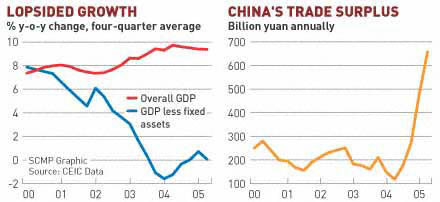|
| ||
|
July 22, 2005
You are on the invidual archive page of Deconstructing China's growth. Click Simon World weblog for the main page.
|
|
Deconstructing China's growth
One of my hobby horses has been China's economy, and in particular the unreliable statistics used to steer the ship. I've created a China economy category to group together these posts*. Jake van der Kamp again finds China's latest GDP doesn't add up: I have a problem with simple things like one plus one equals two when it comes to figures put out by the National Bureau of Statistics. It seems they have an entirely different sort of calculator at work in Beijing. Take the latest announcement that economic growth in the second quarter was 9.5 per cent year on year. It was a bit higher than was entirely welcome, but growth is growth and this certainly looks like a good growth number.Funnily enough, the SCMP also reports the vey same statistics bureau is making policy suggestions and a startling admission: The central government has been advised by the National Bureau of Statistics against introducing further economic tightening measures despite unexpectedly rapid growth so far this year. Despite reporting higher-than-expected gross domestic product growth of 9.5 per cent in the first six months of the year, a government economist said the bureau was predicting that the economy would slow.Nominal GDP growth is a state secret! Why? It can be inferred using a combination of the real GDP and inflation numbers. Except as we've often proved before, these numbers are rubbish. Perhaps revealing nominal GDP would give away the real game? We couldn't have that. You wouldn't even need a special Beijing calculator.
Related posts - Invented the Abacus but can't add up * It's also because I'm sick of searching for them, seeing I often refer back to previous posts. Here's a handy tip for new bloggers: always use categories. posted by Simon on 07.22.05 at 11:49 AM in the China economy category.
Trackbacks:
TrackBack URL for this entry: http://blog.mu.nu/cgi/trackback.cgi/102644 Send a manual trackback ping to this post.
Comments:
More fun with the meaningless statistics pumped out by the NBS and then quoted ad infinitum by those with an investment to sell in China, try looking at FDI in China over 2004-5 and reconciling the claimed 3.2 percent fall y-o-y in first half 2005 to USD28.6 billion when a look back in time shows that the same officials claimed first half 2004 FDI was USD33.9 billion. Using my (non-Chinese) calculator, that should mean that FDI fell in 2005 by 15% y-o-y. Quite frankly, Chinese economic statistics are not worth the paper they are written on. posted by: dylan on 07.22.05 at 12:01 PM [permalink]Even if that paper is worth 2.1% more today than yesterday. posted by: Simon on 07.22.05 at 03:58 PM [permalink]An adjusted 9.5% is a relatively more trustable number than other norminal numbers, I believe. As the head of NBS pointed out a long time ago, nominal number is not just the combination of real GDP and inflation as you have learned in the textbook, but the combination of the former 2 factors plus bluffing number by whoever would benefit from. Among them, fixed asset investment is most unreliable one.(as you know why) Remeber, 40% (an almost unreal figure) of china's economy/output dependson FDI. One thing china is very wary of is gving the world any kind of news that would stop this money flowing in. Re dylan's above comment. I've heard those same statistics and agree. posted by: Martyn on 07.24.05 at 07:28 PM [permalink]Easy - the counterbalancing negative plug for GDP is the new loans going bad at the "banks" and the corrupt money being whisked off to far-away places on behalf of Party members. Once you subtract those state secrets, it probably balances out just fine. posted by: A.West on 07.27.05 at 01:02 PM [permalink] |
|
